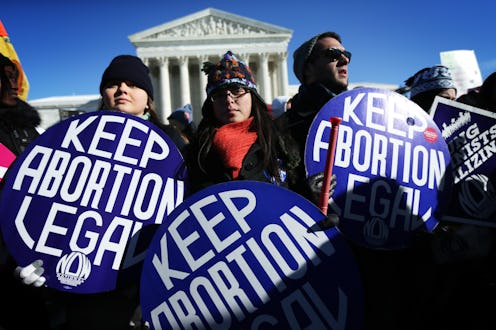News
Why My Abortion Would Be More Dangerous Today

After reaching out to the 1 in 3 campaign, a pro-choice group devoted to encouraging women to talk about their abortions, Bustle spoke with Emily, a woman who had an abortion in Virginia in 2012. She shared why she's worried her safe, affordable abortion wouldn't be an option under the new administration and Congress.
When I had my abortion back in 2012, Virginia required a transvaginal ultrasound, which was a big deal at the time. People were calling it rape by the state, because it wasn't the typical "jelly on the belly" ultrasound. There was a lot of criticism towards the former Virginia governor, Bob McDonnell. I had a mandatory transvaginal ultrasound when I was six weeks along, and I heard the heartbeat. So, I know that at six weeks, the heartbeat was already there.
I stress all these details with the point being that this situation what was extreme five years ago.
The ultrasound alone was very upsetting, I believe that manipulation by the state was the intent. When it came to my actual doctor, I felt no pressure in the clinic. I could tell he was carrying out the required steps: He had take the heart beat; he had to offer me a photo from the ultrasound. I declined.
I didn't want to hear the heartbeat or receive a photo. I didn't feel like it was in any way the doctor's fault. I think he was just doing what was required. It was all about the state trying to humiliate women and make it more painful and personal than it needs to be.
When it comes to our current situation with Steve King's federal pro-life heartbeat bill, I think the concern with the heartbeat bill is not even a matter of shame. It just makes the timing so challenging for women.
I had my abortion just days after I found out I was pregnant, and I was lucky to schedule it so quickly. I think a lot of women, don't feel or see the signs right away. It's not always possible to know that you're pregnant right away. Six weeks is such a short amount of time. I think it would potentially eliminate legal abortion because it would be so hard for women to realize their pregnancy in time.
When I was pregnant, the abortion clinic was 1.5 miles from where I lived, and I had really good insurance, so my abortion was covered. I paid a $30 co-pay out of pocket. Other than that it was so easy to schedule and go through.
Just because you don't have the right to an abortion, doesn't change an individual woman's decision.
In so many ways, I recognize the privilege of my experience. I wasn't forced to come up with hundreds of dollars or thousands of dollars. I don't know what's going to happen with the possible Affordable Care Act repeal, but it seems like this huge HR 7 bill, the government will greatly limit abortion access. (Editor's note: HR 7 permanently bans any federal funds from going to abortion services, which was already in place as an annual stipulation under the Hyde Amendment; it was passed by the House of Representatives this Tuesday).
I have been contemplating, when it comes to my abortion, would I have done something dangerous if it was illegal? I'm lucky that I didn't have to think about that.
People tend to talk about abortion like this really difficult process that you have to think through, talk to your partner, talk to your religious figures about. Maybe for some women that's true, but for me, I immediately knew my decision. I called the abortion clinic before I called my husband; I knew exactly what I wanted to do.
There was no question. Even if I didn't have that option, it wouldn't have made me ready for motherhood. Just because you don't have the right to an abortion, doesn't change an individual woman's decision. I think I would have done anything I needed to get out of the pregnancy, it's horrible to think about, but it's real.
If abortion becomes illegal under the Trump administration, I think doctors will really be putting their livelihood on the line if they keep performing — which doctors obviously did before Roe v. Wade was decided in 1973.
There's a great documentary I saw recently called Trapped; it's about TRAP laws (targeted regulation of abortion laws) and the ways that government imposes unnecessary regulations that force abortion clinics to close. The documentary mentioned a clinic in Alabama where one doctor receives death threats every day.
That documentary showed me that it is already a war. If that's what it's like in some states now, while abortion is legal, I can only imagine what it would've been like when abortion was a crime and doctors could be arrested. We can't go back to that.